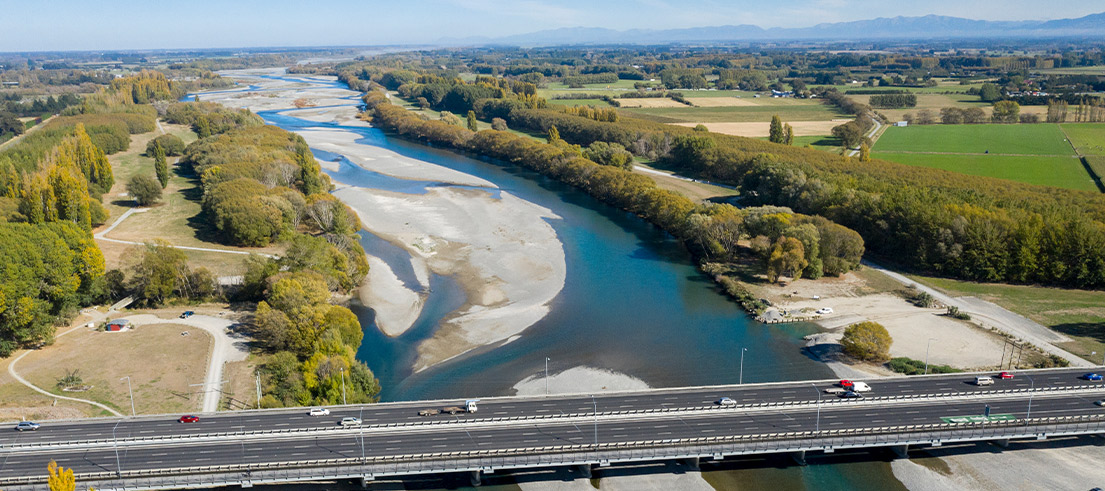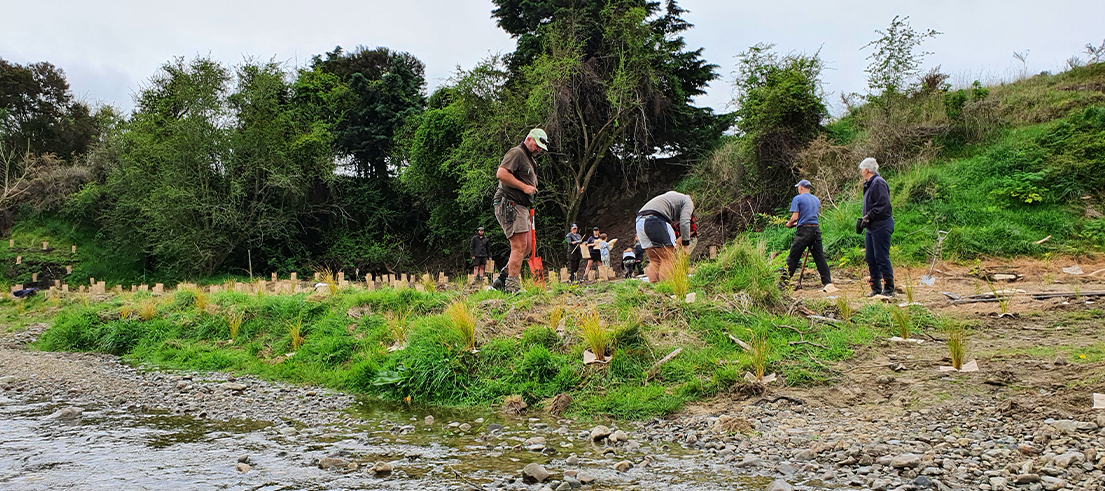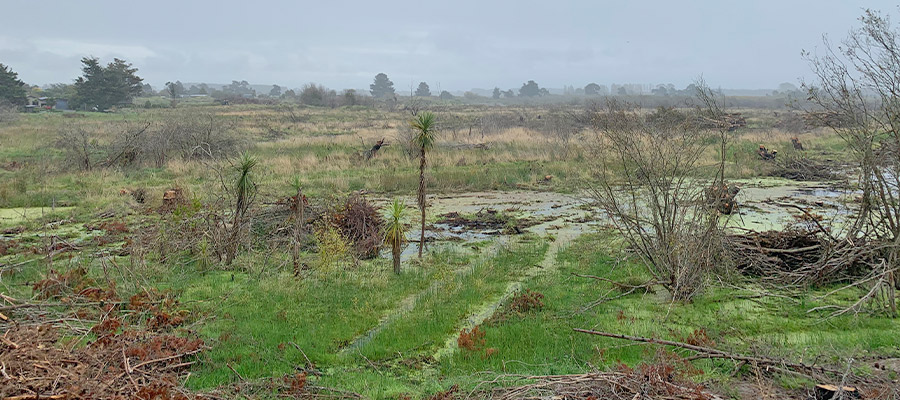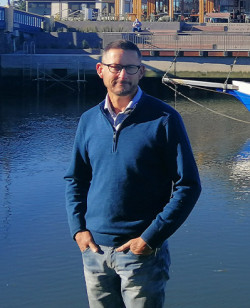
Waimakariri projects get push forward with funding
Waimakariri Water Zone Committee chair Michael Blackwell talks about six local projects the committee has supported through its Action Plan Fund.
The zone committee has been busy working towards the goals set out in our three-year action plan (PDF file, 3.52MB).
Many of these goals work towards improving freshwater quality in our district through support and engagement with community groups.
Committees were provided $50,000 by Environment Canterbury last year, to support projects in their zones which help meet the Canterbury Water Management Strategy targets and their action plans.
Our committee has supported the following projects with this funding:
Waimakariri Biodiversity Trust Establishment Programme
Funding received: $5,000
The Waimakariri Biodiversity Trust (WBT) was established last year, after it was identified by the committee’s Biodiversity Working Group that there was appetite for an independent community-based trust to work collaboratively to protect, restore and develop native biodiversity in the zone. The founding trustees were appointed last year, and the trust was incorporated as a charitable trust earlier this year.
The WBT has received $5,000 to host a visioning workshop for how the trust can support biodiversity in the district. It will also go towards the employment of a coordinator to support locals who want to restore areas of native biodiversity on their land.
It’s aiming for a collaborative approach and wants to create a cohesive group where everyone works together to restore and enhance biodiversity so that we can protect and develop our local indigenous ecosystems.
Waimakariri Landcare Trust and Waimakariri District Council are also supporting the WBT’s establishment, with the District Council supporting the employment of a coordinator to get the trust up and running.
Taranaki Stream Īnanga Spawning Improvement
Funding received: $8,560
This project aims to restore īnanga spawning habitat, increase mahinga kai values, reduce sediment and control erosion in Taranaki Stream, near Waikuku Beach.
Around $8,500 will go towards ecological advice, plants and plant guards, plus some maintenance of the area. The project will focus on 105 metres of stream bank requiring regrading and planting to restore the area and allow native fish species to thrive.
Fencing will also be undertaken, with the project expected to be completed in September 2022.
The total project cost is nearly $23,000, with additional funding from Waimakariri District Council and Environment Canterbury’s Fish Habitat Fund.
Sefton Saltwater Creek Catchment Group Monitoring Programme

Funding received: $6,640
Funding for the Sefton Saltwater Creek Catchment Group’s monitoring programme will enable the first two years of a three-year programme to establish monitoring in the catchment.
The project has received $6,640 for the first and second year of monitoring, covering laboratory and sampling costs, plus administration.
Monitoring sites will be established on Foxs Creek, Boynes Creek, Stoney Creek, Benzies Creek and Saltwater Creek to gather data that over time will show the current state of each waterway and the overall catchment. Sampling will be undertaken by catchment group volunteers and will include eDNA sampling at the bottom of the catchment to identify flora and fauna likely to be present.
Information on levels of E. coli, nitrogen and phosphorous will be gathered, plus temperature and other basic stream health indicators. This data will complement monitoring programmes being carried out by other organisations in the catchment.
The project supports a whole catchment approach and will be able to inform any actions or community-led projects to maintain and improve water quality, biodiversity and mahinga kai values within the catchment.
Waimakariri Landcare Trust, New Zealand Landcare Trust, Environment Canterbury and Waimakariri District Council are also supporting the project, which is estimated to cost a total of $9,445 for three years of monitoring.
Northbrook Trail Corridor
Funding received: $10,000
The proposed Northbrook Trail Corridor is a walkway situated alongside farmland and will highlight the cultural and historical significance of the area, while allowing riparian and mahinga kai restoration.
It provides an opportunity to connect urban and rural communities by showcasing innovative and sustainable farming practices, such as creating much wider riparian margins.
The project is split into two stages and is proposed to run from Marsh Road, north to the Northbrook wetlands.
The Waimakariri LandCare Trust is leading this project, which is estimated to cost a total of $210,000 over three years. The zone committee has supported the trust with $10,000 in the first year for weed management, planting and fencing.
Waimakariri District Council is also providing funding for works and significant staff support for the project. Other funding sources for the remaining cost of the project are being confirmed.
Ashley Rakahuri Estuary Shorebird Monitoring
Funding received: $5,000
Managed by the Ashley Rakahuri Rivercare Group (ARRG), this monitoring programme has received $5,000 to monitor the breeding of shorebirds around the Ashley Rakahuri/Saltwater Creek estuary – their species, nest locations and breeding outcomes.
Banded dotterel/tūturiwhatu, pied stilt/poaka, black-fronted tern/tarapirohe, white-fronted tern/tara, South Island pied oystercatcher/tōrea, black-billed gull/tarāpuka and black-backed gull/karoro will all be monitored in the Saltwater Creek and Ashley Rakahuri River estuary area from August 2022 to February 2023, over the breeding season and a report on findings compiled.
Pines Beach wetland willow control

Funding received: $14,800
Led by the Te Kōhaka o Tūhaitara Trust, this project supports the control of willows along Pines Beach, enhancing the establishment of native wetland habitat in a 22-hectare area.
The trust received $14,800 for willow control and the total project cost is around $29,000 which includes additional planting and signage. Te Rūnanga o Ngāi Tahu and Trees that Count are also supporting the project.
The project in its entirety is expected to be completed in July 2023, depending on wetland conditions for planting.
Arohatia Te Awa Project
Another good example of collaborative efforts within our district is the Arohatia Te Awa project, which is a Waimakariri District Council project, supported by Environment Canterbury, on the Ruataniwha/Cam River system from its junction with the Kaiapoi River back up to Rangiora. We hope to one day link up this project with the good work beginning on the Northbrook Trail Corridor further upstream.
Meeting our goals
Each of the projects align well with our action plan, with tangible actions and outcomes that will improve, enhance and restore water quality, biodiversity, recreation and mahinga kai values in the zone.
They focus on a range of actions such as fencing, planting, weed control, monitoring and administration-style support such as helping to establish a community-led biodiversity trust.
All the projects that received funding align with our committee’s action plan priorities by:
- lifting the standards of how we care for our freshwater so that the first priority is to ensure its life supporting capacity is maintained or improved,
- increasing indigenous biodiversity,
- improving mahinga kai values in the zone,
- improving monitoring of groundwater and surface water,
- and protecting and enhancing recreation.
I'm proud the committee can support projects like these and am excited to see where they head into the future.
This committee is focused on trying to make these types of on-the-ground projects happen. Please get in touch by emailing Murray.Griffin@ecan.govt.nz, if you have any suggestions or ideas that your group feels might align with the goals of freshwater quality improvement.
Ngā mihi, Michael.

Michael Blackwell, Waimakariri water zone committee chair
